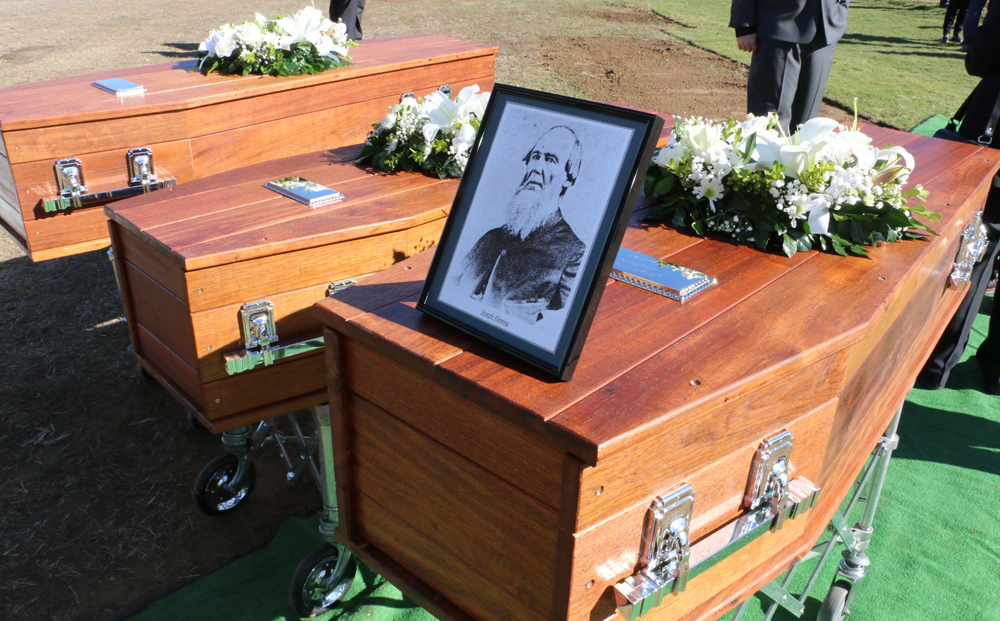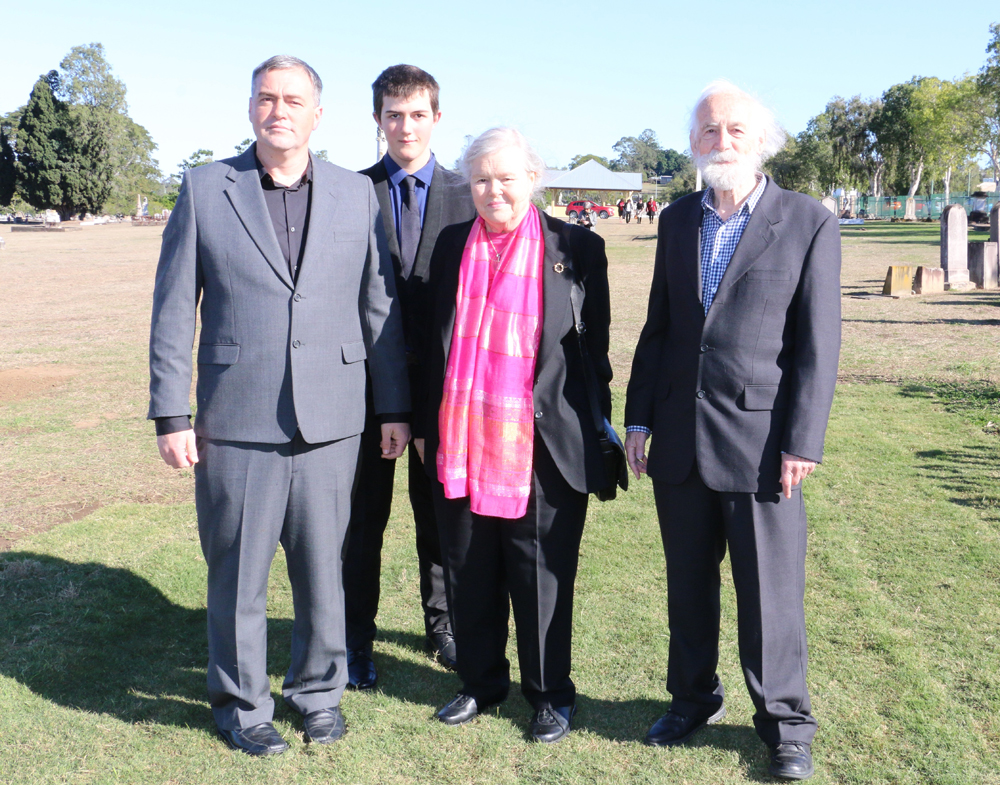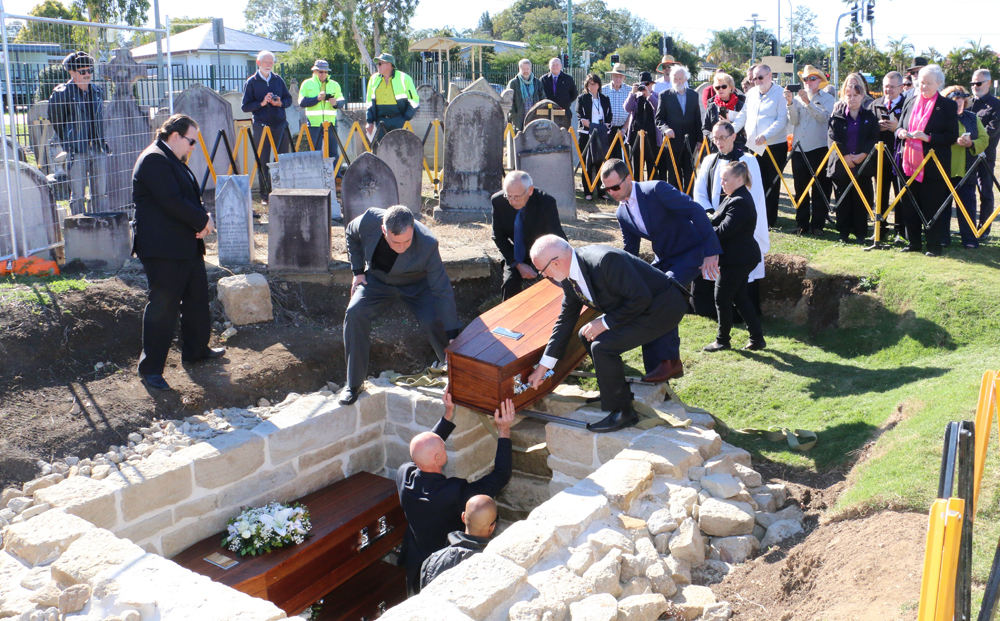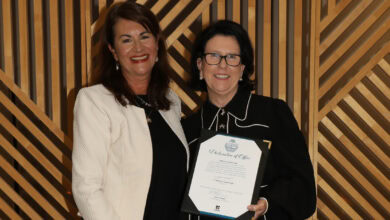The direct descendants of Joseph and Phoebe Fleming were on hand to witness their reinterment at Ipswich General Cemetery on Tuesday.
Great-great-granddaughter Elizabeth Roberts, from Sydney, was the guest of honour as Ipswich City Council completed one of its most unusual but truly amazing community projects.
Council discovered the location of the underground Fleming crypt at the north-east section of the cemetery in 2017.
It was known that circa 1997 the crypt roof partially collapsed and the crypt was filled in with soil and covered over for public safety.
The crypt is the final resting place of Joseph Fleming, his wife Phoebe and their daughter Caroline Smith (nee Fleming).
He was a member of the first Queensland Parliament more than 150 years ago; representing West Moreton from 9 July 1860 until 3 November 1862 and again from 11 September 1866 until 2 July 1867.
In 2018, council, together with the University of Southern Queensland, set about digging up and rehabilitating the crypt, culminating in the reinterment this week.
USQ Professor Bryce Barker and his team found remains scattered over the crypt floor. They were surprised by the extent of damage inside – grave robbers more than a century ago plundering, coupled with the sands of time.
USQ teams expected to find clothing remnants, boots, belts, buttons and personal items that would have been buried with the deceased.
The only items found were two wedding bands, one ceramic button, one badly corroded bone hair comb, coffin handles for three coffins, coffin nails and remnant metal coffin embossing.
The remains of the three Flemings were taken to the USQ Archaeology labs where honours student Lawson Rennie, under the supervision of Professor Barker, catalogued and separated the skeletal remains into their right groups.
The remains were placed in an ossuary box (a box that holds bones) inside the coffins that were custom manufactured by council staff.
“The project partners, including the USQ School of Archaeology and Film and Television School, LR Thomas Funeral Directors and Classical Stone Australia, have provided their expertise and work at no cost and have held to the highest standard of giving back to their community,” a council spokesman said.

Mr Rennie met with Mrs Roberts, 74, in NSW earlier this year and he described it as “very emotional”.
“We had a lovely time together and while she was shocked at what happened in Ipswich she is very happy about what (council) has organised for the ancestors. She is one of the very few direct descendants of Phoebe and Joseph Fleming,” he said.
“It was a wonderful moment when I gave her the (Fleming) rings to hold, she was thrilled and as she said ‘it was a little creepy’. These were something that her ancestors had owned, had worn.
“She was very excited to have me there and to be able to discuss the Fleming family.”
Mr Rennie said Mrs Roberts had been aware of the existence of the Fleming crypt in Ipswich General Cemetery, but had no idea about its deterioration and subsequent restoration by council.
“It all came as a complete shock to her,” he said.
On his research trip, Mr Rennie also discovered where Joseph Fleming was born in Pitt Town, Sydney and, remarkably, it was around the corner from where he was staying.
“They made the whole experience quite surreal,” he said.
Joseph and Phoebe Fleming’s youngest daughter Elizabeth Ann married David William. Elizabeth and David had a daughter Elizabeth Caroline, who married Percy Parkes. Elizabeth and Percy had a son, Ralph, who married Emma Lapper. Ralph and Emma had a daughter, Elizabeth Roberts.

Elizabeth Roberts with son Henry, grandson Harry and husband John.
Mrs Roberts’s son Henry and grandson Harry were among the pallbearers at the ceremony on Tuesday. Her husband John was also in attendance.
“This is great. I am really impressed with all the effort everyone has gone to and the amount of work that has been done,” Mrs Roberts said.
“I am a heritage professional and can truly appreciate the work. This is just wonderful. The community should be very proud.”
Mrs Roberts described the moment she put the two Fleming rings on her own wedding finger.
“The three rings were remarkably similar. I have a very old fashioned wedding ring and I couldn’t believe how close they were.”
She told the gathering of about 60 people that she had researched the Fleming family history but could not have imagined being part of “this wonderful achievement”.
The prayer service was conducted by Father Steve McMahon, Rector of St Paul’s Anglican Church, Ipswich, with council’s Interim Administrator Greg Chemello welcoming guests.
Council’s Ashley Ward, principal officer (policy and projects), Planning and Regulatory Services, gave the vote of thanks after a year of co-ordinating the project.
Born in NSW in 1811, Joseph Fleming settled in Queensland in 1848. In September 1850 at Ipswich he bought town lots to establish a boiling-down works, sawmill and flour-mill located at Bundamba on the river. He was also a partner in the steamer “Bremer” trading to Brisbane.
After his political career ended, Mr Fleming was a store-keeper in Ipswich and Roma. He died in Ipswich in 1891. He had nine children with his wife, who died in 1853.
It is hoped a documentary film produced by USQ will be finalised with post production editing and cutting and a virtual reality tour completed after the final part of the historic project.
Also read:



My grandfather, George fleming was a descendant. I’m interested in the family history.